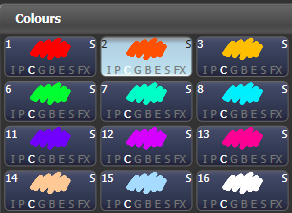Using Palettes
Recalling a Palette Value
Recalling From a Button
To recall a palette value from a button:
Select the fixtures to be changed. Shared palettes can be set to any fixture of the same type. Normal palettes will set individual values to each fixture. If no fixtures are selected, the palette will apply to all fixtures it is relevant to.
Press the Palette button you want to recall. The palette will be set to the selected fixtures.
You can make palettes fade over a time when you recall them, see Timing with Palettes.
When a palette is used in the programmer, the touch button will light up to indicate this (you can disable this in the User Settings). This makes it easier to see which palette you have selected.

Recalling From the Keypad
You can also recall a palette by its number by typing the number on the numeric keypad.
Select some fixtures
Press Palette above the numeric keypad
Type in the number of the palette you want to recall
Press Enter or Apply Palette
The Apply Palette softkey shows the legend of the palette which will be applied.
If you want to recall multiple palettes simultaneously you can use the Blind to Live function. Put the console into Blind mode (either press the Blind button if provided, or hold Avo and press
<Keys.SoftKey>Blind Inactive</Keys.SoftKey>. Select the palettes you want to use. Enter a
fade time in seconds on the keypad (or 0 to snap), then press
<Keys.HardKey>Blind</Keys.HardKey> again. The palettes will fade to the live output.
Palette Pages
If you have stored palettes on physical buttons on the console, the
+Page/-Page buttons will change to a different page of palettes.If you want a palette to be locked on its handle and not change when the page is changed, you can set a lock or transparent lock on the palette handle. See Handle Paging for more details about locks.
Each of the palette windows can either display pages of palettes, with page buttons on the left, or a continuous scrolling window of palettes. To change between pages and scrolling, touch the Pages Show/Hide button in the context button area to the left of the menu buttons, then change pages using the page buttons to the left of the palette buttons.
You can recall a palette from any page using its number as described in the previous section.
Only Showing Relevant Palettes
If the User Setting Filter Relevant Palettes is enabled, when you select fixtures any palettes which are not applicable will grey out. This is very useful to see which palettes are available for the fixtures you are working with.
Quick Palettes with no Fixtures Selected
If you press a palette button when no fixtures are selected, the palette will be set to all the fixtures the palette applies to. This is called a Quick Palette.
For example if you've got some colour palettes programmed for your MAC 2000s, pressing one of the palettes when no MAC 2000s are selected will set the colour to all the MAC 2000s.
Effects palettes can't be recalled as Quick Palettes.
Setting Palettes to All Fixtures in a Playback
You can apply a palette to all fixtures in a particular playback. Hold the palette button and press the select button of the playback which the palette is to apply to.